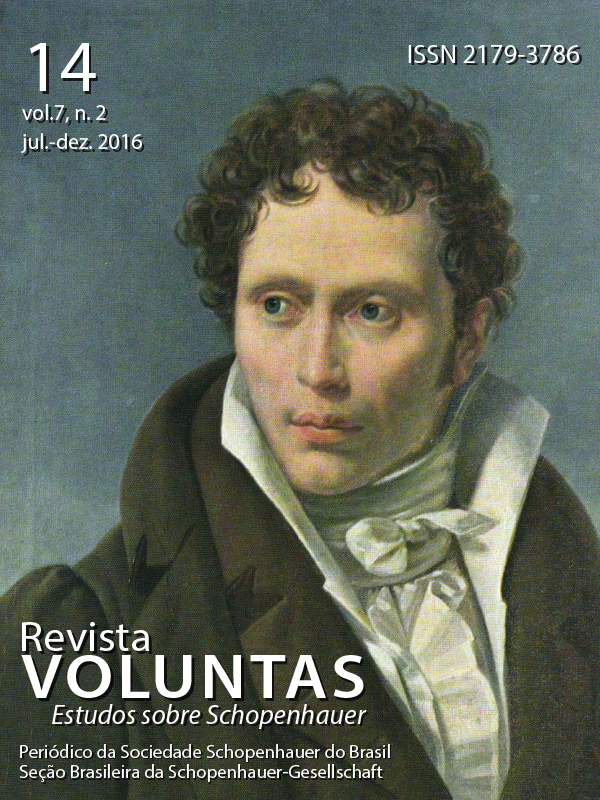A reading of "O Primo Basílio" according to schopenhauer's philosophy
DOI:
https://doi.org/10.5902/2179378633725Keywords:
Tragedy, Realism, NovelAbstract
From the standpoint of the schopenhauerian conception of the tragedy, it can be said that the portuguese writer Eça de Queirós' novel "O primo Basílio" presents the sublime character of the tragic. We can find in this novel not only the exposure of the extreme unhappiness , essential to the tragedy as a text, but also the exposure of the human misery, as well as the empire of evil, the resignation and the unavoidable path towards death. Besides, it is a harsh critique of the society, it's false moralism and it's mediocrity. Thus, in the eyes of the schopenhauerian philosophy, Eça not only has written a masterpiece, for he apprehends the essence of mankind and writes a novel wich might be considered a tragedy in a sense, but also he arraigns all sorts of hoaxes in the bourgeois society, in human affairs and even in human character.
Downloads
References
SCHOPENHAUER, A. Aforismos para a sabedoria de vida. Trad. Jair Barboza. São Paulo: Martins Fontes, 2009.
SCHOPENHAUER, A. De la quadruple racine du principe de raison suffisante. Trad. F.X. Chenet. Paris: Librairie Philosophique J. Vrin, Edition complète, 1991.
SCHOPENHAUER, A. Metafísica do belo. Trad. Jair Barboza. São Paulo: Editora UNESP, 2003.
SCHOPENHAUER, A. O mundo como vontade e como representação. Tomo I. Trad. Jair Barboza. São Paulo: Editora UNESP, 2005.
SCHOPENHAUER, A. O mundo como vontade e representação. Tomo II. Trad. Eduardo Ribeiro da Fonseca. Curitiba: Editora UFPR, 2014.
SCHOPENHAUER, A. Sobre a vontade na natureza. Tradução, prefácio e notas Gabriel Valladão Silva. Porto Alegre: L&PM, 2013.
ARISTÓTELES. Poética. Lisboa: Fundação Calouste Gulbenkian, 2011.
CACCIOLA, Maria Lúcia Mello e Oliveira. Schopenhauer e a questão do dogmatismo. São Paulo: Edusp, 1994.
FONSECA, Eduardo Ribeiro. O sentido da noção de sublimação na filosofia de Schopenhauer. Revista Voluntas: estudos sobre Schopenhauer. Rio de Janeiro, Vol. 1, Nº 2, 2010, pp. 68-88.
FRANÇA, José-Augusto. O Romantismo em Portugal. 6 vols. Lisboa: Livros Horizonte, 1974.
GRUMACH, Ernest (Hrsg.). Unterhaltungen mit Goethe (Conversações com Goethe). Weimar: Böhlau, 1956.
PHILONENKO, Alexis. Une Philosophie de La Tragédie. Paris: Vrin, 1999.
QUEIRÓIS, Eça. O Primo Basílio. São Paulo: Abril Cultural, 1979.
YOUNG, Julian. Schopenhauer. New York: Routledge Taylor & Francis Group, 2005.
SARAIVA, António José. História da literatura portuguesa. Publicações Europa-América, 1949.
SENNETT, Richard. O declínio do homem público: as tiranias da intimidade. Tradução: Lygia Araújo Watanabe. São Paulo: Companhia das Letras, 1999.
SIMÕES, João Gaspar. Eça de Queirós: a obra e o homem. Lisboa: Arcádia, imp. 1961 H.G.
SZONDI, Peter. Ensaio sobre o Trágico. Rio de Janeiro: Jorge Zahar Ed., 2004.
Downloads
Published
How to Cite
Issue
Section
License
The submission of original manuscripts to this journal implies the transference, by the authors, of the copyrights for printed and digital publication. The copyrights of a published manuscript belong ultimately to the author, and only the copyright for its first publication is reserved to the journal. Authors may only use the same results in other publications explicitly indicating this journal as the medium of the original publication.
Licence
Attribution-NonCommercial-ShareAlike 4.0 International (CC BY-NC-SA 4.0) - This license lets others remix, tweak, and build upon your work non-commercially, as long as they credit you and license their new creations under the identical terms.






